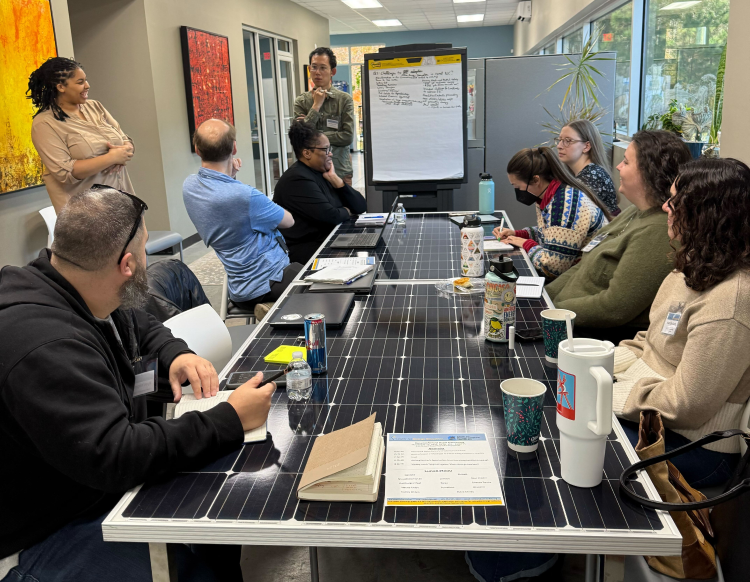Showing 26 results

Daniel Farber | December 11, 2025
A recent U.S. Office of Management and Budget (OMB) memo proclaimed the Trump administration’s commitment to “deregulating at an unprecedented scale.” To advance that agenda, the memo tells agencies to put a thumb on the scale in favor of rollbacks. In contrast, most lawyers and economists would say that regulation and deregulation are subject to the same rules. Sometimes, the conventional wisdom is right.

Sophie Loeb | December 2, 2025
On November 13, 20 folks attended the second annual rural clean energy convening in Roanoke Rapids, North Carolina, co-sponsored by the Center for Progressive Reform and the Center for Energy Education. Attendees included academics, energy policy advocates, small-scale developers, technical experts, and government representatives. We built off last year’s convening, addressing the new North Carolina policy landscape and context given the repeal of federal funding, the state’s proposed unfavorable carbon plan, and rising energy burden in communities.

Daniel Farber | July 8, 2025
In one of President Donald Trump’s first executive orders, he eliminated a centralized system that Jimmy Carter initially set up to issue regulations governing environmental impact statements. Instead, he called on each agency to issue its own regulations, which seems to have caused the predictable amount of confusion. I’ve examined the new regulations from three agencies: the Department of Defense (DOD), the Department of Energy (DOE), and the Department of Transportation (DOT), which happened to be the first ones that I saw. There seems to be little rhyme or reason in the variations.

Alejandro Camacho, Robert L. Glicksman | June 30, 2025
NEPA requires government agencies to use a transparent process with meaningful public participation to consider the potential environmental effects of their actions before committing to them. It is one of the United States’ bedrock environmental protection statutes and has been so widely emulated in other countries that it has become known as the “Magna Carta” of global environmental law. In the U.S., however, NEPA has recently been the subject of withering scrutiny and attack by critics across the political spectrum. Its opponents have called for the narrowing of NEPA’s scope and the “streamlining” of its processes, charging that the Act’s core mandate to “look before you leap” has spun out of control and created unintended and massive obstacles to approval of critical infrastructure.

Daniel Farber | May 20, 2025
President Donald Trump has taken some dramatic steps in the name of improving use of NEPA, the statute governing environmental reviews of projects. The goal is to speed up the permitting process and make it more efficient. The reality is that his efforts will create chaos and uncertainty, with the likely effect of slowing things down.

Sophie Loeb | April 23, 2025
As North Carolinians continue to grapple with rolling blackouts, rising energy bills, and recovery from a once-in-a-generation hurricane event, another pending environmental catastrophe is developing in our backyards. On Monday, May 5, the North Carolina Utilities Commission will hold a public hearing to gather feedback on Duke Energy’s plans to build a second new methane gas power plant near its existing coal plant on Hyco Lake in Person County as part of the state’s decarbonization plan.

Daniel Farber | January 28, 2025
A sleeper provision in one of President Donald Trump’s executive orders attempts to revolutionize the way the National Environmental Policy Act (NEPA) operates and cut environmental review to a minimum.

Daniel Farber | November 12, 2024
In what could turn out to be another loss for environmental protection in the Supreme Court, the Court is about to decide a major case about the scope of the National Environmental Policy Act of 1969 (NEPA). The case, Seven County Infrastructure Coalition v. Eagle County, has important implications for issues such as whether NEPA covers climate change impacts. The same groups that succeeded in drastically cutting back on federal wetlands jurisdiction a few years ago are hoping to do the same thing to environmental impact statements. This post will provide the key background on the case.

Joseph Tomain | September 24, 2024
T.S. Eliot was wrong. April is not the “cruellest month.” June is. In slightly over two weeks at the end of June 2024, the United States Supreme Court made mass murder easier, criminalized homelessness, partially decriminalized insurrection, ignored air pollution and climate change by curtailing agency actions, made it more difficult to fine securities and investment frauds, and deregulated political corruption while failing to affirmatively protect women with possibly fatal pregnancies. To this list, add the Court’s July 1, 2024, ruling effectively giving Donald Trump a pathway to an authoritarian presidency by delaying his criminal trials and then, as extralegal protection, effectively immunizing him from the worst of possible crimes. How did we get here? Rena Steinzor's new book, American Apocalypse, makes an important contribution to the literature examining the Right by bringing together several movements that have landed us where we are today.